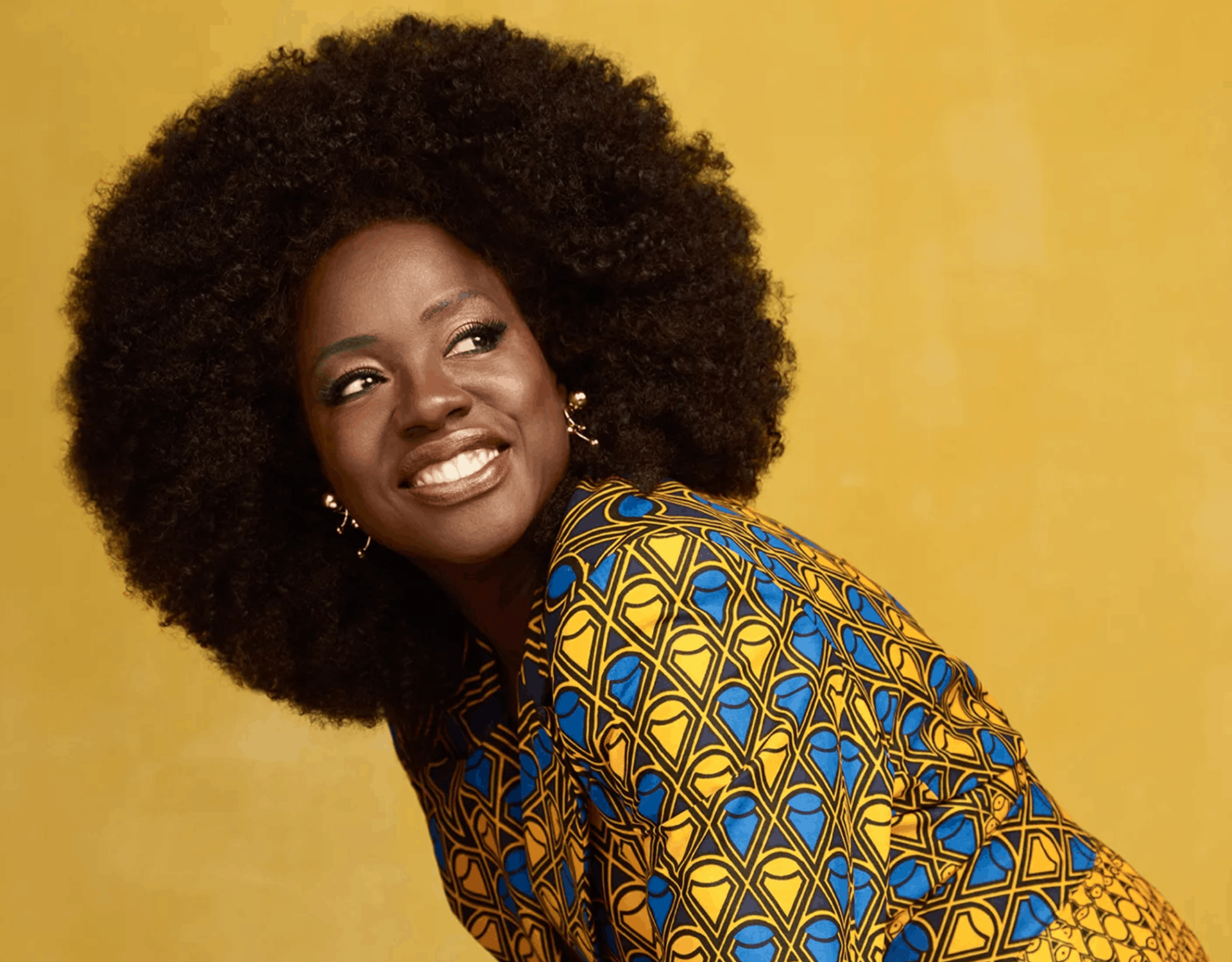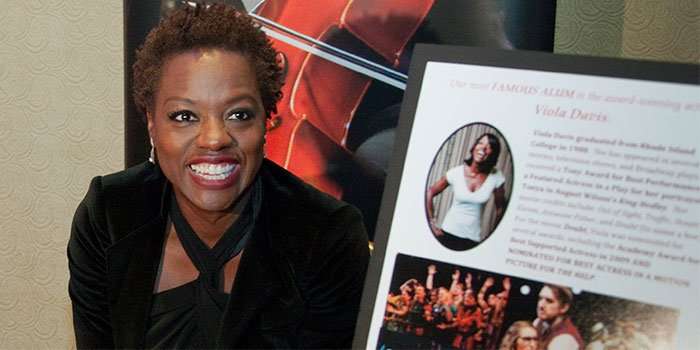Viola Davis: Actress, Philanthropist, & Route 1 Native
Anyone who hears the life story of actress Viola Davis is likely to wonder what actress will portray her in a biopic. That’s because the dramatic storylines of Davis’ characters are on par with her own narrative. Born about 20 miles off Route 1 in St. Matthews, South Carolina, the infant Davis and her family moved up the highway to reside in Central Falls, Rhode Island. Just a stone’s throw away from the Route, Davis lived in several different residences, all the while dealing with extreme poverty and familial conflict. In spite of her limiting circumstances, Davis managed to push herself to receive a formal acting education: first at Rhode Island College, next at one of the most prestigious institutions in the world, the Juilliard School. From that point, Davis’ career continued to grow, characterized by a richness rarely witnessed in Hollywood: one bent on lending shape and meaning to every shade of human existence, by drawing from personal values.
Viola Davis’ Early Life and Childhood
Viola was born to Dan and Mae Davis in 1965, on what she has described as a “one-room shack” on her grandmother’s farm in South Carolina. Her mother was a maid and a factory worker; her father worked as a horse trainer. Right after she was born, Davis and another sibling moved with her parents to an old mill town Central Falls in Rhode Island. (Her two other siblings stayed behind with their grandmother.) The Davises were the first African American family to live in the town, which they’d relocated to in hopes of finding work for her father at one of the two nearby racetracks. In addition to her day jobs, Davis’ mother campaigned as a civil rights activist for welfare reform. Davis recalls, at age two, spending hours in a holding cell after a protest outside Brown University resulted in her mother’s arrest. In interviews, Davis recounts her childhood through the lens of extreme poverty. She shared with the New Yorker her memories of living in a condemned building at 128 Washington Street, a little over a mile off Route 1. As rent-free tenants, the family often had to get by without heat or electricity. Davis could hear rats killing pigeons in the attic at night; the vermin also ate the faces of her dolls, and she got in the habit of going to bed with rags tied around her neck to prevent them from biting her in her sleep. Davis recalled going frequently going hungry, with school lunches as her only meal. She learned to dumpster dive, steal, and receive food from other families in order to survive. “I will continue to say it,” Davis told the Rhode Island Monthly. “When you’re poor, nobody sees you. You are invisible. You are not a part of anyone’s demographic. You don’t have access to anything. Even if someone has a solution to a problem, the problem always requires some semblance of money.” Adding to the stress of financial insecurity was Davis’ father, an alcoholic who would regularly get drunk every payday and acted violently: beating his wife, or once ripping the door off the refrigerator. This experience of extreme lack and chaos deeply impacted Davis. As a teenager, she responded to the trauma by learning how to disassociate from her body. She would lock herself in the bathroom, clear her head, and wait “until I felt myself literally floating out of my body. I could actually look at myself like I was maybe five steps away from myself.” Davis also reported wetting the bed until she was 14. All these factors added up to an erratic academic performance. But at the same time, a deeper transformation was taking place in Davis. She learned to not allow her external circumstances to define her inherent value as a human being. She also began to explore acting as a way of taking agency in her own life and claiming its narrative. “I wanted to connect with myself,” she told the Rhode Island Monthly of her decision to act. “I was tired of waking up feeling like, oh gosh, I’m a bedwetter. Oh, my god, I don’t have any hot running water, no phone, I’m hungry, I don’t think I’m pretty, I’m too fat. That’s how I would start my day, then go to bed with that same narrative and not ever tapping into: ‘Okay, Viola: All those things may be true, but you’re still worthy of love.”
Davis’ Acting Education and Career
At age 14, Davis enrolled in an acting class through Upward Bound: a federal program that preps low-income students for higher education. She gave acting her all and found that it gave back to her in equal measure: she described the experience of acting as delivering her “perfect joy.” After graduating high school, Davis received a full scholarship to attend Rhode Island College, the alma mater of her mentor from the Upward Bound program. Davis continued acting and, upon graduating, was admitted to the prestigious Juilliard School. While she had ambivalent feelings about the program itself, she viewed her education there as a formative time that allowed her to think and question deeply. After graduating from Juilliard in 1993, Davis began acting as a career. She starred in several plays, earning a Tony Award nomination for her performance in Seven Guitars in 1996. Davis persisted in playing small on-screen parts and both on-and-off-Broadway plays until earning a Tony in 2001 for her role in the Broadway production King Hedley II. Despite her well-earned reputation as a deeply respected actress throughout the early 2000s, mainstream Hollywood didn’t come to fully recognize Davis and her talent until her 2011 role as a maid in the deep South in the film The Help. While her performance earned her an Academy Award nomination, two Screen Actors Guild Awards, and vaulted her career into the next echelon of stardom, Davis didn’t see the role as the most impactful one of her career. “I look back at that movie as a missed opportunity,” she told The Guardian, because “it was just too filtered down. I know Jim Crow, I understand that time period. It’s a 100-year time period that was rife with lots of violence and anger, and people with lost dreams and hopes. I wanted the frustration and that anger to be more palpable.” In 2015, Davis began acting in one of her most beloved roles to date, as a law professor in the legal thriller series How to Get Away with Murder. The role earned Davis a beloved fan base, and she became the first African American woman ever to win an Emmy for lead actress in a drama. Around this same time, she began working with multiple charities aimed at helping alleviate hunger and other humanitarian efforts. In 2020, Davis donated $100,000 dollars to support an acting program at her high school alma mater, Central Falls High School where her sister still works as a theater teacher. Throughout all her work and the recognition and prestige it’s earned her, Davis continues to make one message clear: that every person is inherently valuable and capable of self-love through a deeper connection to themselves, no matter their social standing or monetary influence. “Your poverty is not a reflection of you,” she told the Rhode Island Monthly. There is a place inside all of us—I don’t care how kumbaya this sounds—it’s a voice. Everyone has it. With women and girls, we call it intuition. With me, I call it authenticity.”
Elisia Guerena RI Central Falls Mar 11, 2021 People
Mar 11, 2021



